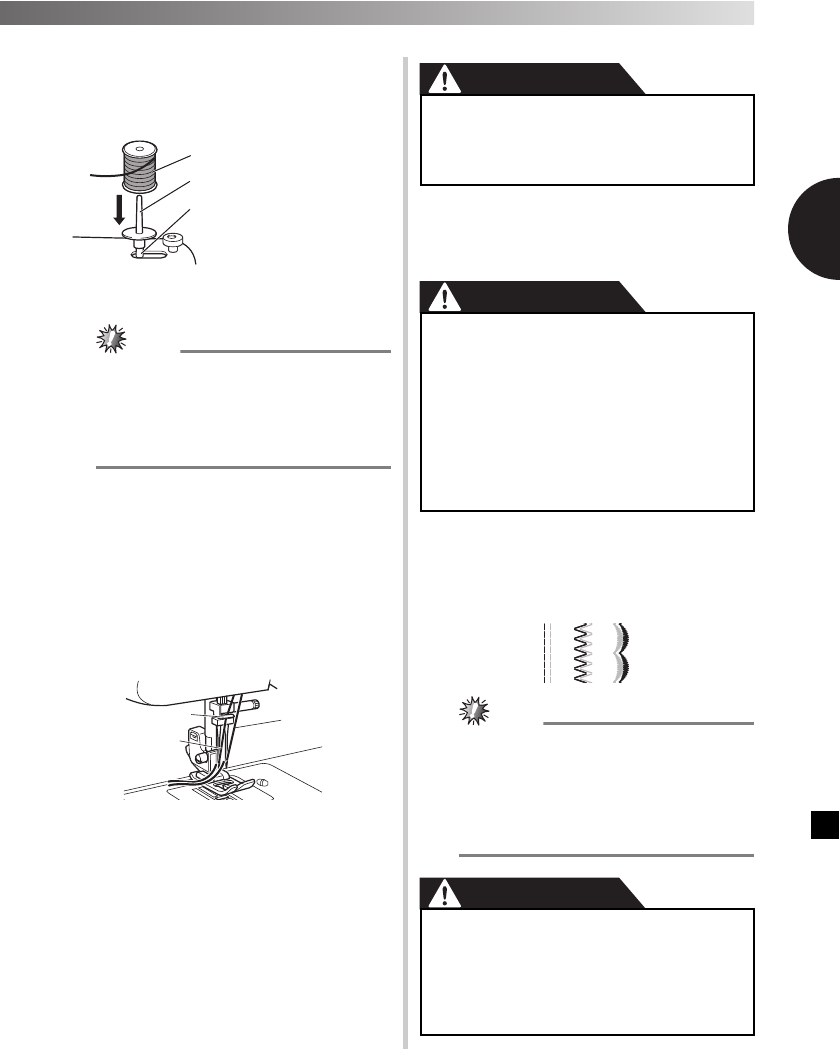
26
—————
———————————————————————————————————————————————————————————————————————————————————————————————————————————————————————————————————————————————————————————————————————————————————————————————————————————————————————————————————————————————————————————————————————————————
2
■ Attaching the extra spool pin
Insert the extra spool pin onto the end of the bobbin
winder shaft. Install the second thread spool onto
the extra spool pin.
■ Twin needle threading
You should thread each needle separately.
Note
Models equipped with a needle threader
● You cannot use the needle threader to
thread the twin needle. Instead, thread the
twin needle by hand, from front to back.
Using the needle threader may damage the
machine.
1
Thread the left needle.
Follow the same instructions for threading a
single needle (see page 17).
2
Thread the right needle.
Thread the right needle in the same way that
you threaded the left needle using the thread
from the spool on the extra spool pin, but do not
pass the thread through the guide above the
needle before you pass it through the eye of the
right needle.
1 Left needle thread passes through the needle
bar thread guide
2 Right needle thread passes in front of the needle
bar thread guide
3 Needle bar thread guide
3
Attach zigzag foot “J”.
For details on changing the presser foot, refer
to “Changing the presser foot” on page 8.
CAUTION
4
Turn on the machine.
5
Select a stitch.
CAUTION
6
Start sewing.
For details on starting to sew, refer to “Starting
sewing” on page 23.
X Two lines of stitching are sewn parallel to
each other.
Note
● When using the twin needle, the stitches
may become bunched together, depending
on the types of thread and fabric that are
used. If this occurs, increase the stitch
length. For details on adjusting the stitch
length, refer to “Stitch length dial” on
page 12.
CAUTION
1 Bobbin winder shaft
2 Extra spool pin
3 Thread spool
1
2
3
1
3
2
● When using the twin needle, be sure to
attach zigzag foot “J”, otherwise the
needle may break or the machine may be
damaged.
● After adjusting the stitch width, slowly
turn the handwheel toward you
(counterclockwise) and check that the
needle does not touch the presser foot. If
the needle hits the presser foot, the
needle may bend or break.
● When using the twin needle, make sure
the stitch width is not set above “2.5”
since this may cause the needle to hit the
needle plate and break.
● When changing the sewing direction, be
sure to raise the needle from the fabric,
and then raise the presser foot lever and
turn the fabric. Otherwise the needle
may break or the machine may be
damaged.


















